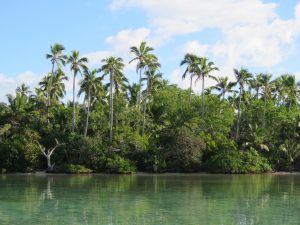As President Emmanuel Macron increases France’s engagement in the Indo-Pacific region, New Caledonia, a French overseas territory in the Pacific, is poised to hold a referendum on whether to remain a part of France or pursue independence, possibly putting Macron’s regional ambitions at risk.
The question of independence is a fraught one and goes back decades. The upcoming referendum, the second of a possible three, is guaranteed by the 1998 Noumea Accord, one of a number of agreements that brought about the end of a civil war fought in New Caledonia throughout the 1980s between New Caledonia’s indigenous Kanaks and the French state and has underpinned peace and stability ever since. Under the agreement, Paris continues to be in control of the five sovereign powers of defense, foreign affairs, currency, justice and public order in New Caledonia.
New Caledonia’s second referendum will be held on October 4, nearly two years after the first, in which 56.7 percent of voters opted to remain a part of France, with the vote largely split between the Kanaks, who make up 40 percent of the population, voting for independence and people of European origin voting to remain.
New Caledonia sits at the center of France’s recently announced Indo-Pacific strategy. France’s smattering of overseas island territories contribute 93 percent of France’s exclusive economic zone, making it the number two global maritime nation, after the United States. France also maintains around 8,000 troops in the region.
Despite New Caledonia’s importance to Paris, Kanak pro-independence groups have long argued that they have been treated as lesser citizens and suffer social and economic disadvantages, and thus seek independence.
With only 3 percent of Kanaks graduating from higher education institutions compared to 23 percent of the rest of the population, the Kanak youth unemployment rate still sits at an alarming 38 percent – four times greater than for the rest of the population.
Dr. Catherine Ris, director of the Research Centre on Economics and Law at the University of New Caledonia, said that despite the New Caledonian government having invested heavily in education, healthcare, transport and communication, there continue to be persistent inequalities for Kanaks.
“From the last data available, in 2014, we had 5 percent of the Kanak population graduating from higher education compared to 28 percent for the non-Kanak population. There’s then a very strong correlation between the level of education and the type of job you get,” she said. “Only 10 percent of high-status jobs are held by Kanaks, despite making up 40 percent of the total population. As long as there are huge differences in education there will be huge differences in the labor market.”
Ris said that a mining boom in New Caledonia over the last 15 years should have lifted the entire population but instead led to an exponential widening of the income gap.
“We have a pretty high level of people living below the poverty line. What we know from the last data available, in 2008, is that we had 17 percent of the population living below the poverty line but we actually expect it has increased over the last 10 years,” she said. “A lot of new revenues have been created and distributed to the population, but not to everyone. The high salaries increased much more than the low salaries.”
Denise Fisher, a former Australian consul-general to New Caledonia and now a visiting fellow at the Australian National University’s Centre for European Studies, said while the last referendum was a clear win for anti-independence groups, it was a closer vote than expected and was a wake up call to Paris.
“France was very shocked. They were shocked that after 30 years of concessions, and they have made real concessions, that after all this time, nothing had changed. Pro-French and independence groups and the French state have made enormous efforts over the last 30 years. The proof is that we’ve had peace for 30 years and relative prosperity,” she said.
For the upcoming referendum, polls predict a similar result to the first, but Fisher said demographic changes, voter turnout and new political alliances could well shift the outcome.
“In the first referendum, the [remain] vote won by 18,000 votes but with an 81 percent turn out, that’s around 33,000 people who didn’t vote and since then, you’ve got another 6,000 more young people who’ve become eligible to vote so they’re both going to be targeting those groups. When you look at the figures, anything’s possible.”

































